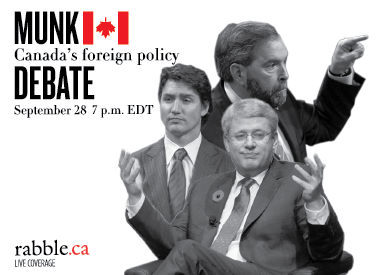Like this article? rabble is reader-supported journalism. Chip in to keep stories like these coming.
Party leaders Stephen Harper, Thomas Mulcair and Justin Trudeau debated foreign policy issues on Monday night as activists outside the event in downtown Toronto demanded action on the refugee crisis.
The debate, hosted by Munk Debates at Roy Thomson Hall and moderated by Rudyard Griffiths, saw a number of feisty exchanges between the party leaders as they answered questions on refugees, Russia, trade, climate change and American relations.
Once again, Green Party leader Elizabeth May was shut out of the debate, but participated via Twitter.
The debate format, which featured drawn-out one-on-one exchanges on specific topics, allowed for deeper examination of the issues and fewer talking points than did The Globe and Mail’s debate on economic issues two weeks ago.
With dozens of activists outside the hall calling for a bigger response to the refugee crisis, Harper said that unlike his rivals, his party was “not chasing headlines” — a characterization that Mulcair called “disrespectful” — with their plan to allow for 10,000 more Syrian and Iraqi refuges than originally anticipated.
Trudeau responded by noting that Toronto welcomed nearly 40,000 Irish refugees in the 1800s when the city’s population was only 20,000, but Harper pointed out those people were fleeing famine, and these refugees are fleeing a war of terrorism, suggesting that any refugee program must come with a fulsome security screening process.
Harper also made it clear that the Conservatives are the only party that would continue airstrikes against ISIS, with the Mulcair vowing to only participate in combat missions sanctioned by NATO or the UN, and Trudeau urging for Canadian forces to scale back to just a training and advisory role in the conflict.
On the matter of terrorism at home, Harper and Trudeau squared off over a law passed by the Conservative government that strips people convicted of terrorism offences of their citizenship.
After Harper asked why someone wouldn’t revoke citizenship for such offences, Trudeau shot back: “A Canadian is a Canadian is a Canadian.”
“You devalue the citizenship of every Canadian in this place and in this country when you break down and make it conditional for anybody.”
When Mulcair brought up the NDP’s history of voting against bills that infringed upon civil rights by pointing to Pierre Trudeau’s use of the War Measures Act in 1970, Trudeau took a moment to reflect on the legacy of his last name, 15 years to the day after his father died.
Professing that he was “incredibly proud” of his father’s achievements as prime minister, Trudeau said that his father would prefer that the leaders were “planning for the future,” not digging up arguments about the past, in a not-too-subtle dig at Mulcair’s references to events more than 40 years ago.
The Keystone XL pipeline also raised the temperature in the room, with the Conservative leader suggesting that the “protectionist” NDP put principles over jobs.
Mulcair retorted by questioning what the “Canadian value” in “exporting 40,000 jobs” to the U.S. might be, before Trudeau chimed in to chide Harper for straining relations with the U.S. by going south of the border to criticize President Barack Obama’s refusal to sign off on the pipeline.
Of course, there were other points upon which all three leaders agreed — on supporting Ukraine in the face of Russian incursions and Israel in the Middle East — despite their efforts to differentiate themselves from each other on these issues.
The audience, somewhat surprisingly, also added drama to the proceedings, clapping at leaders’ statements despite Griffiths’ request that they save their applause to the end, and laughing — both with and at — the leaders for some of their bon mots.
Harper drew some chuckles — unintentionally, one presumes — for saying that he has a “great relationship” with the Obama administration. When Mulcair and Trudeau were sparring over the former’s tenure as environment minister in Quebec, the NDP leader quipped that Trudeau “doesn’t understand debates, because he’s used to having his lines written for him.”
Well, maybe you had to be there for that one.
Nevertheless, with no more leaders’ debates with Harper set for the remainder of the campaign — sorry, anybody hoping for a substantive discussion on Indigenous issues — the Munk Debate at least produced a clearer image of where each party stands on foreign policy questions with less than a month to go before election day.
Read the play-by-play of the Munk debate on foreign policy here.
Mike Barber is a freelance writer and editor in Toronto who swears he’s this close to finishing his MA thesis.



